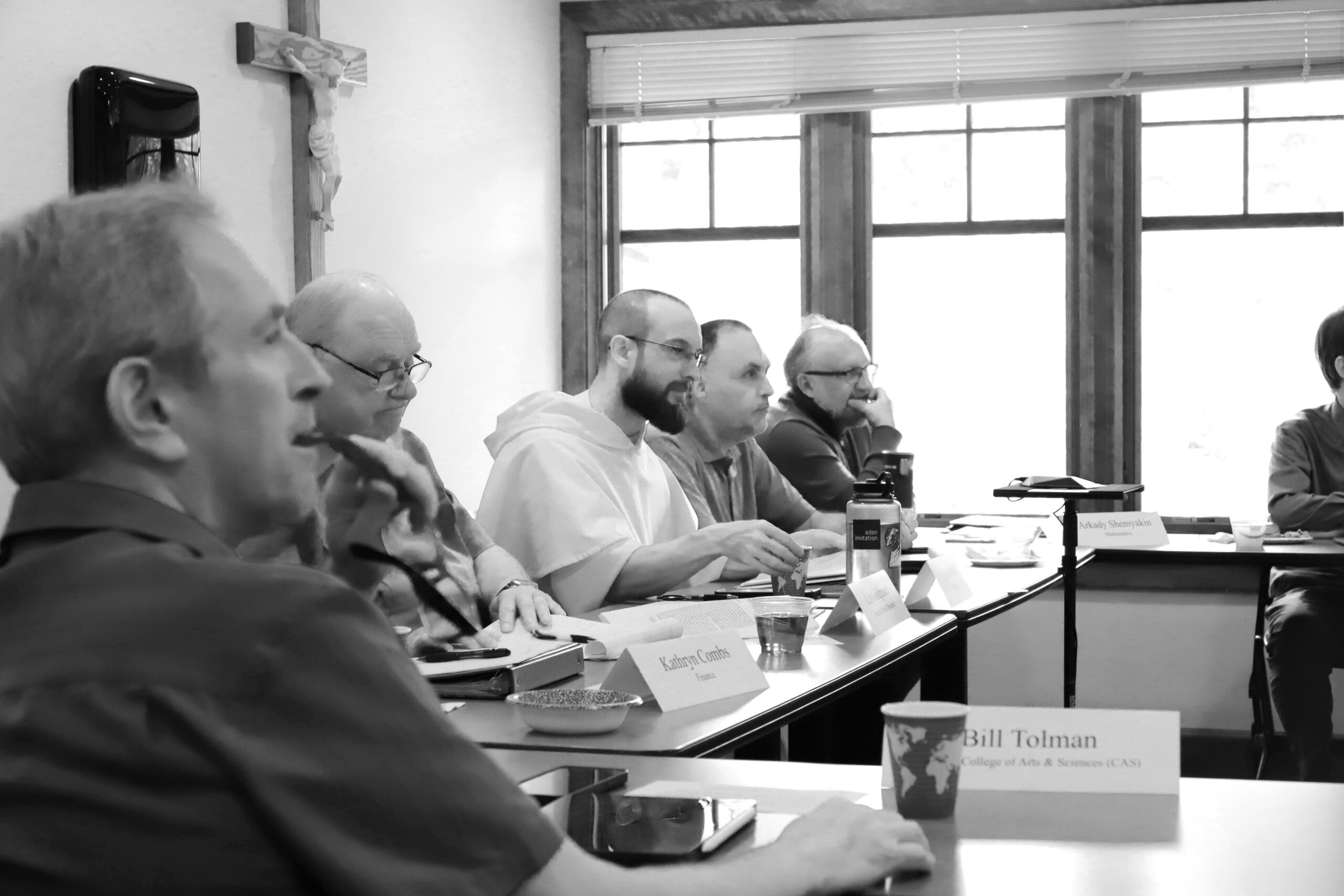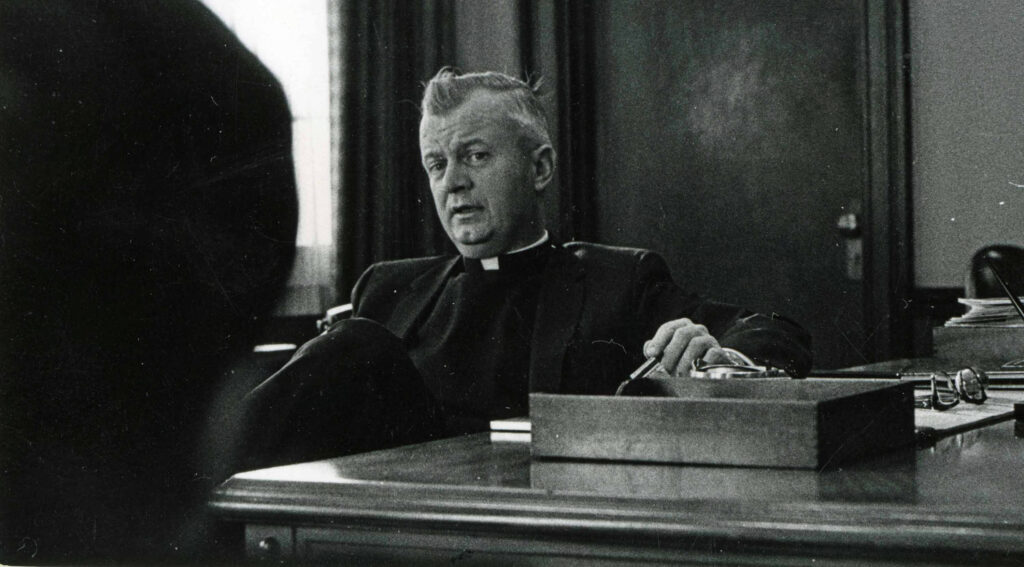CATHOLIC STUDIES HOSTS ANNUAL FACULTY SUMMER SEMINAR
In preparation for Catholic Studies’ 30th anniversary next fall, I recently visited the university archives where documents and records from the early years are carefully tucked away for research such as this.
A box that contained issues of the Signature, the student-led newsletter of the Catholic Studies program in the 1990s, caught my eye. Several familiar headlines stood out, including “Got Catholic Identity? The Ongoing Struggle of the Catholic University.” (March 1998)
I was intrigued. The conversation about the identity of a Catholic university began in the 11th century, was brilliantly articulated by St. John Henry Newman in the 19th century and has been deliberately considered in every era since. Thus, the reason for the Interdisciplinary Faculty Summer Seminar, held in Sitzmann Hall the first week of June.
Hosted every year by Catholic Studies and university faculty, the purpose of the five-day seminar is for scholars from all disciplines to engage in and deepen their understanding of the mission of a Catholic university broadly and St. Thomas specifically. Every faculty member is invited to participate.
The first seminar in 1993 began with the guiding principle that all universities need renewal, especially in rapidly changing societies. With the belief that no single academic discipline can provide an account of the entire reality, the interdisciplinary approach provides space for faculty to inform, balance, correct and complement one another.
The 2022 seminar, organized by Dr. Phil Rolnick (Theology), Dr. Jeff Jalkio (Physics) and Dr. Michael Naughton, included faculty from engineering, business, mathematics, theology and philosophy, as well as Dougherty Family College. Interim President Rob Vischer, Provost Eddy Rojas and Dr. Bill Tolman, the new dean of the College of Arts and Sciences, participated as well.
Naughton shared that this is the first time in the summer seminar’s nearly 30-year history that university leadership was so well represented. “They came to the seminar not as administrators but as colleagues enhancing the conversation on the complex and important nature of Catholic mission and identity.”
This year’s seminar explored three competing claims of what defines the soul of the university: faith and reason; reason alone; and justice and change.
FAITH AND REASON
Since its founding in the Middle Ages, the Catholic university has been given the responsibility and the opportunity to bring together in confident dialogue these two modes of gaining knowledge: the open-ended search for all the truths available to human reason and the grasp and investigation of all truths that have been made known through the fount of truth, the Logos, Jesus Christ.
REASON ALONE
Whereas a Catholic university view sees the complementarity of faith and reason as the height of human wisdom, the modern research university, beginning in the 18th and 19th centuries, sees reason alone as the surest path to knowledge. In other words, the more reason and human action can be unburdened from religion and its historical context, the more the human mind – through science, technology and pragmatic rationality – will achieve progress.
“Given the highly diverse world we live in, seminar organizers did not expect to achieve a uniformity of belief by the end of the week...”
JUSTICE AND CHANGE
The 1960s brought a third view of the university focused on justice and change. Largely dissatisfied with the religious and modern views, the university is about challenging and dismantling the dominant power structures of society so that a more equitable, diverse, and inclusive system can emerge. The role of the university is not to understand or interpret the world but to change it.
Given the highly diverse world we live in, seminar organizers did not expect to achieve a uniformity
of belief by the end of the week; however, they did achieve intelligent, in-depth exploration of the issues and, in doing so, achieved new levels of collegiality.
The conversation will continue during the next Faculty Summer Seminar (June 5-9, 2023) which will focus on the distinctive characteristics of the Gen Z student and what that means for a Catholic university. Once again, all St. Thomas faculty will be invited and will receive a stipend for attending.
Faculty Summer Seminar 2022
JUNE 6: AN HISTORICAL OVERVIEW
Dr. Michael Naughton, Director, Center for Catholic Studies
“A Brief History of the Catholic University”
Dr. Jeff Jalkio, Associate Professor, Engineering “Alasdair Macintyre’s Three Rival Versions of Morality and What They Say About Our Three Rival Visions”
JUNE 7: THIS WORLD ALONE
Dr. Arkady Shemyakin, Department Chair, Mathematics
“A Siberian Experience of STEM”
Dr. Rosemarie Monge, Associate Professor, Opus College of Business
“A St. Thomas Experience of Teaching Business Ethics: Conflicted Visions of The Common Good – Secularism and Transcendence”
JUNE 8: A CATHOLIC PERSPECTIVE
Dr. Stephen Laumakis, Professor, Philosophy “The Very Idea of a University: Aristotle, Newman, and Us”
Dr. Kenneth Goodpaster, Professor Emeritus, Opus College of Business
“Teleopathy: A Tempting Disorder for Universities”
JUNE 9: JUSTICE AND CHANGE
Dr. Mark Spencer, Associate Professor, Philosophy “A Catholic Vision of Justice and Change in the University”
Dr. Buffy Smith, Dean, Dougherty Family College “Reducing Inequalities in Higher Education”
JUNE 10: WHAT DOES THIS MEAN FOR ST. THOMAS?
Dr. Jeff Jalkio, Associate Professor, Engineering “Lonergan: Bias and Cosmopolis”
Dr. Eddy Rojas, Provost Seminar Summary
This story is featured in the fall-winter 2022 issue of Lumen.







